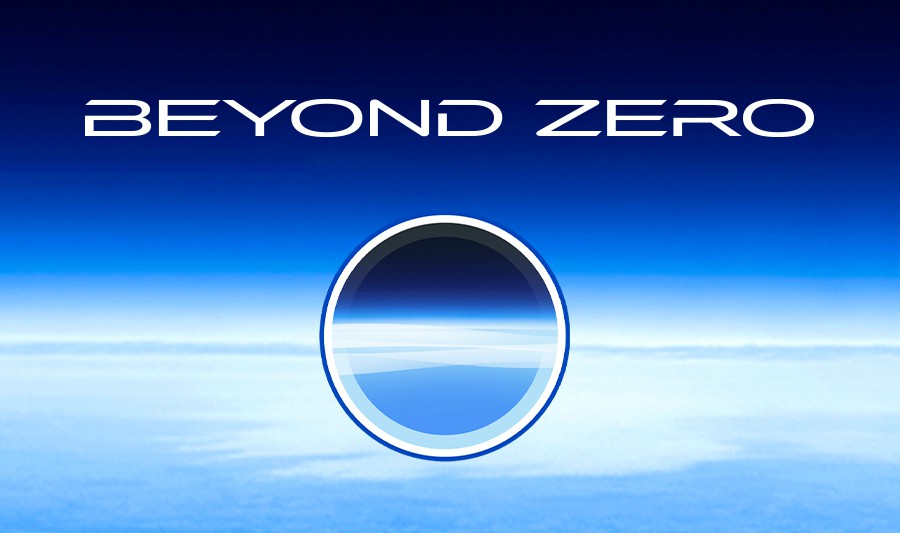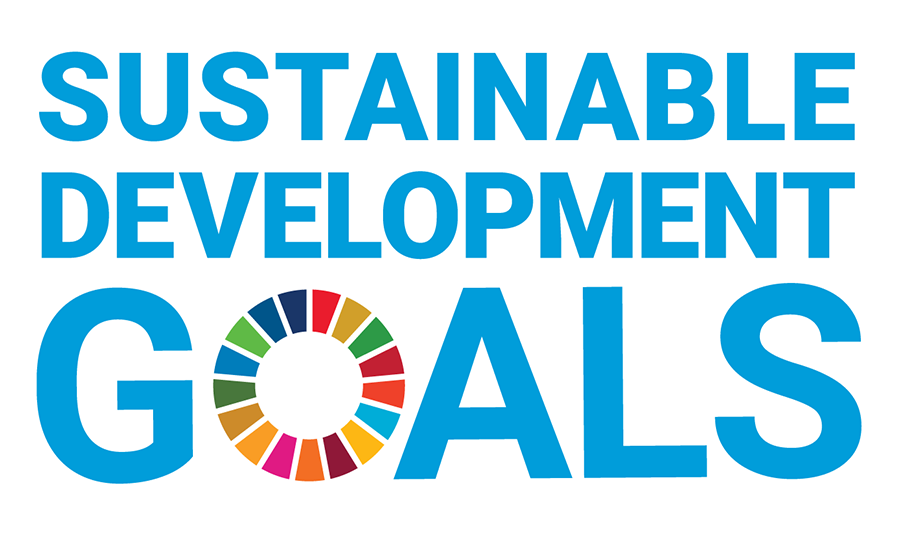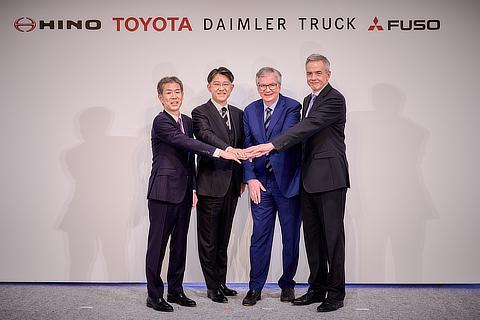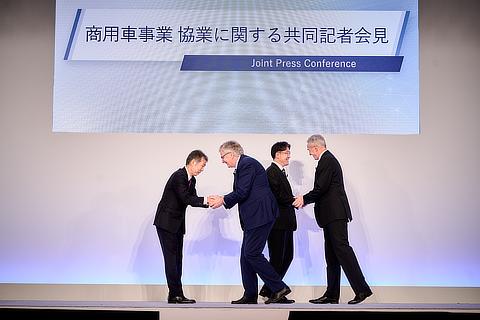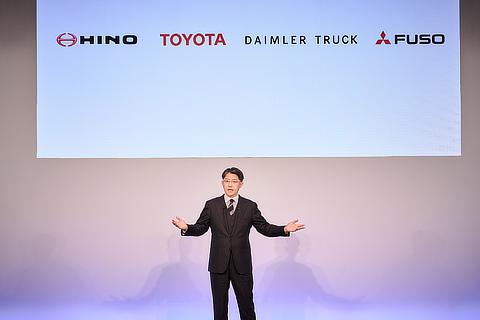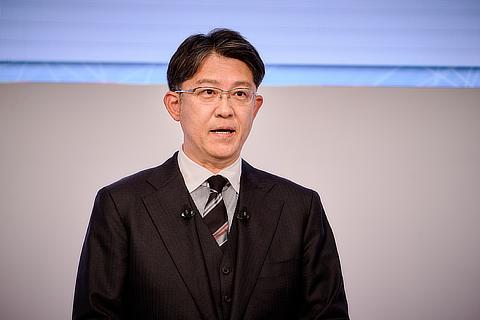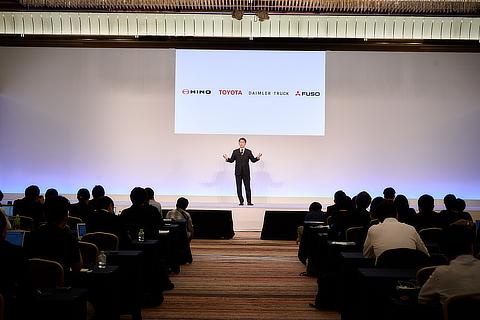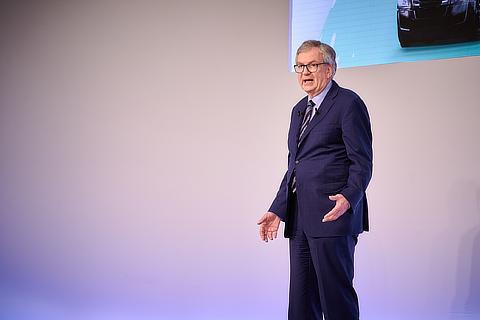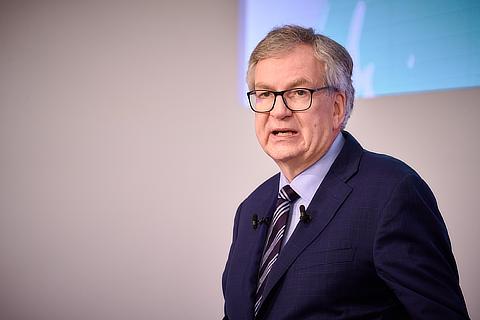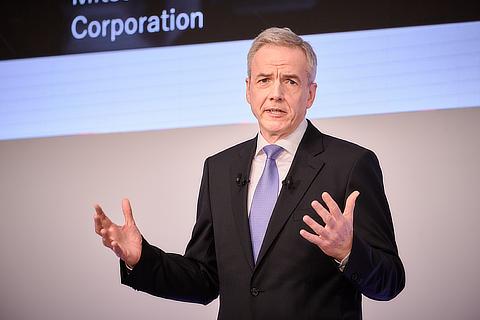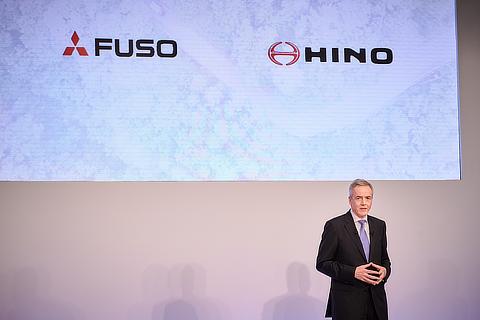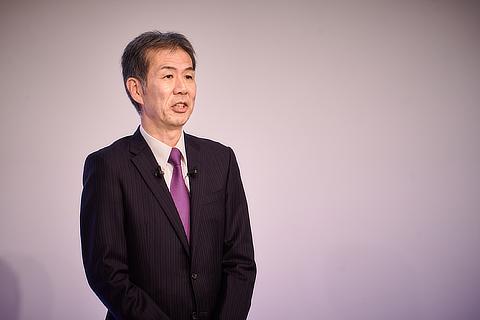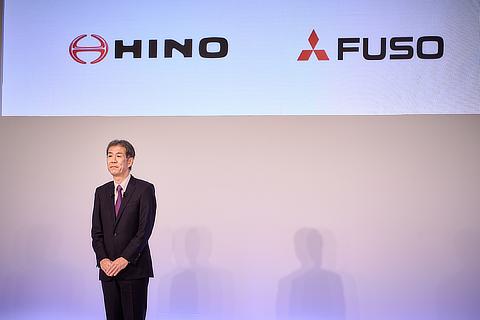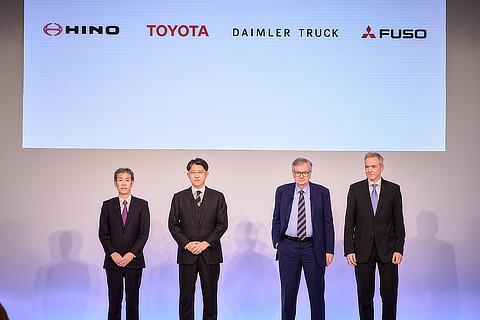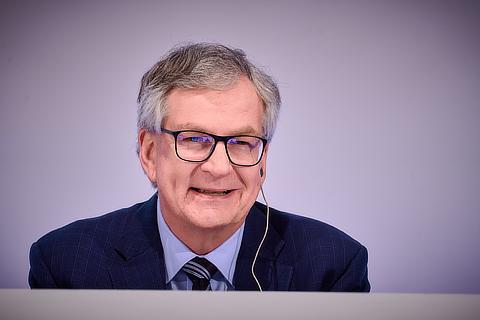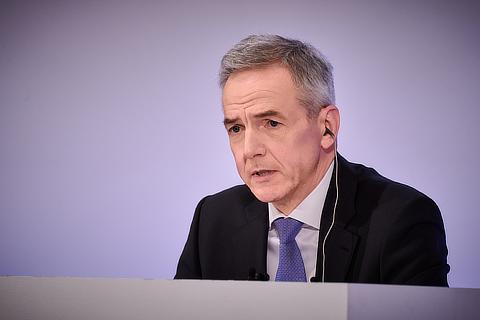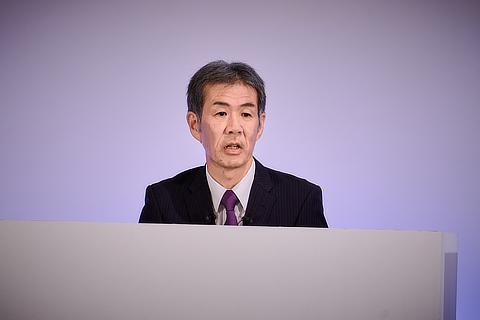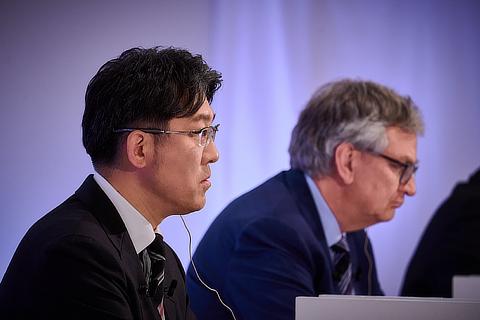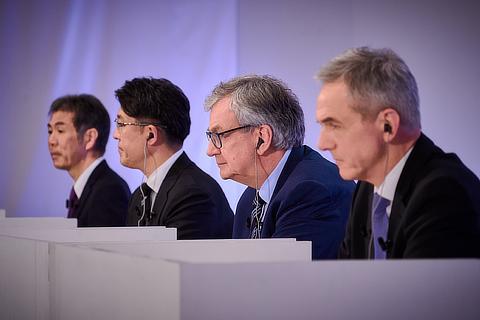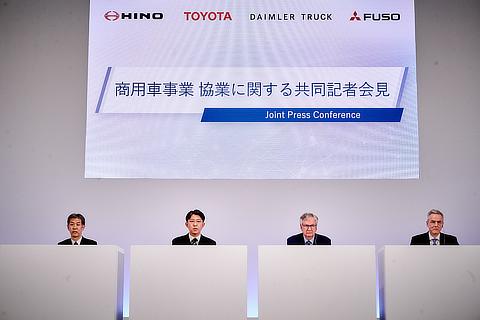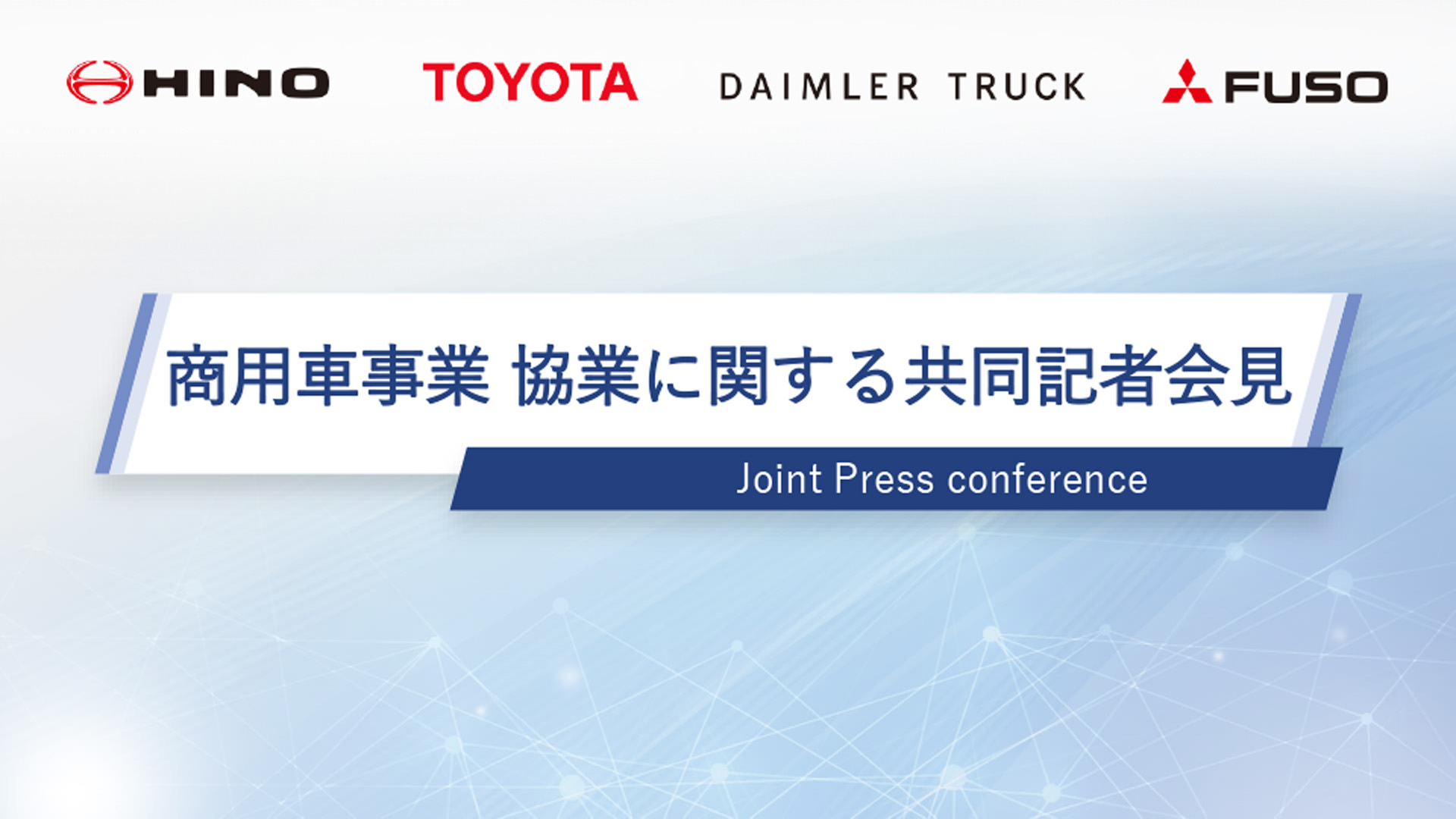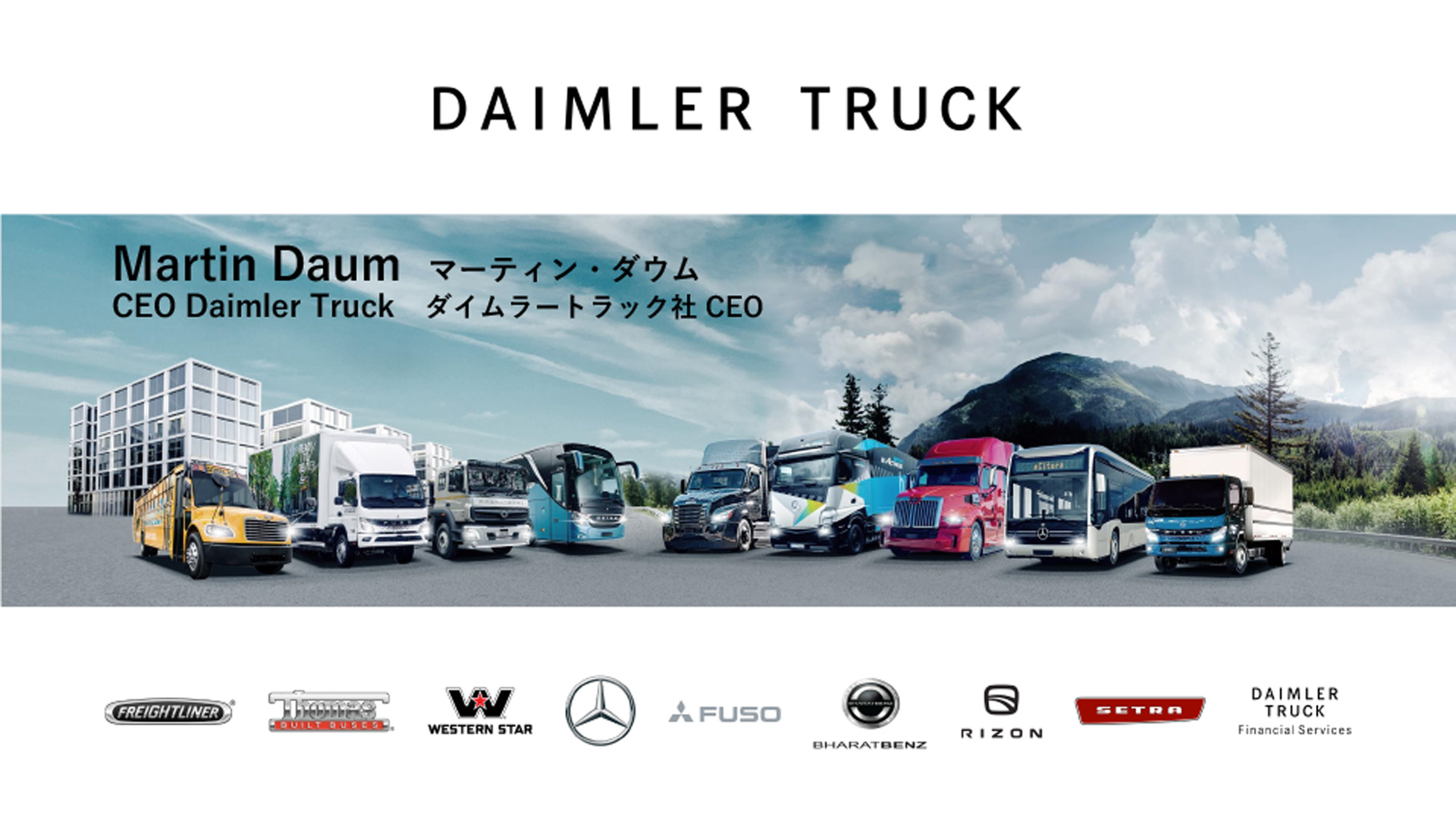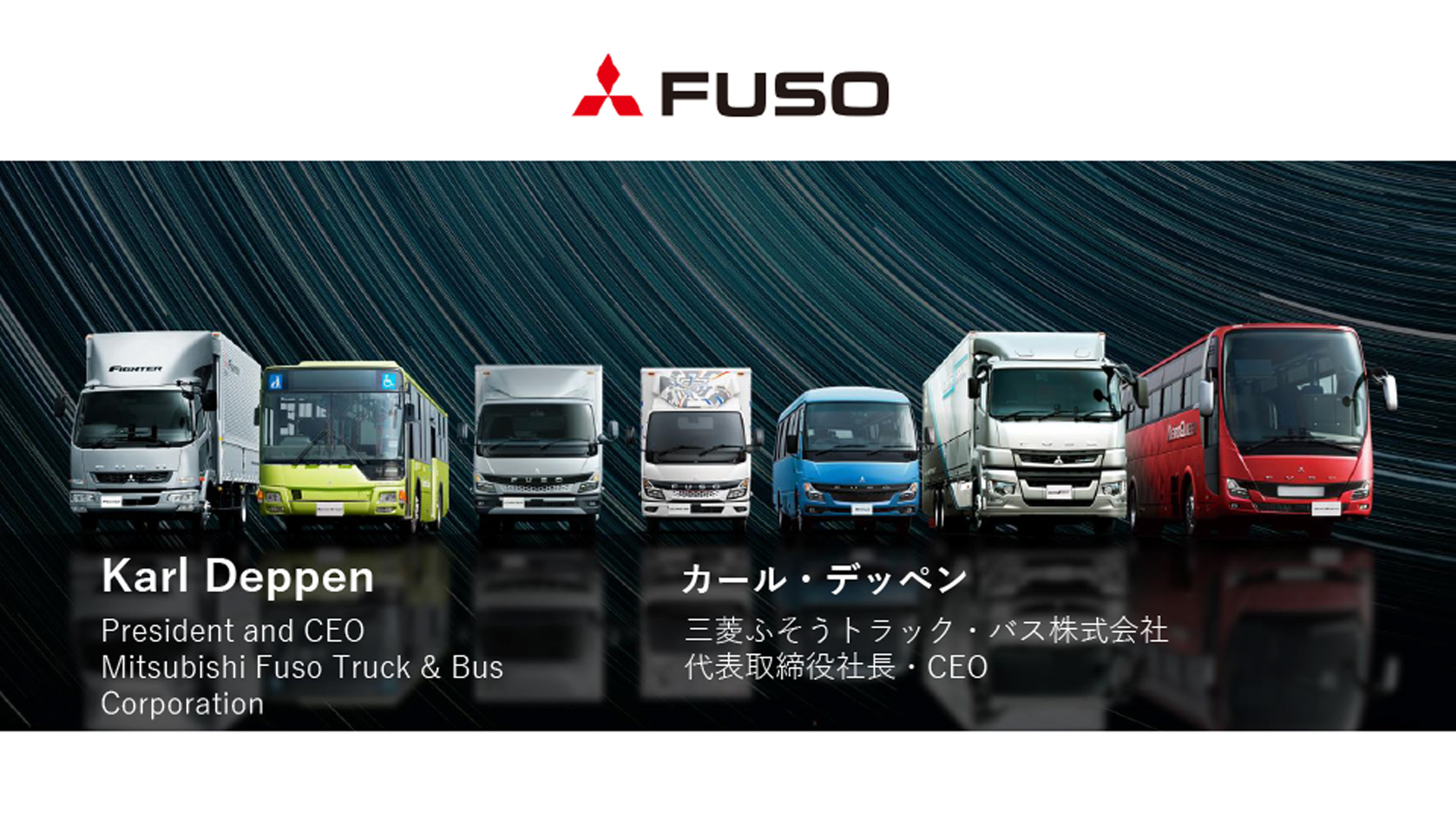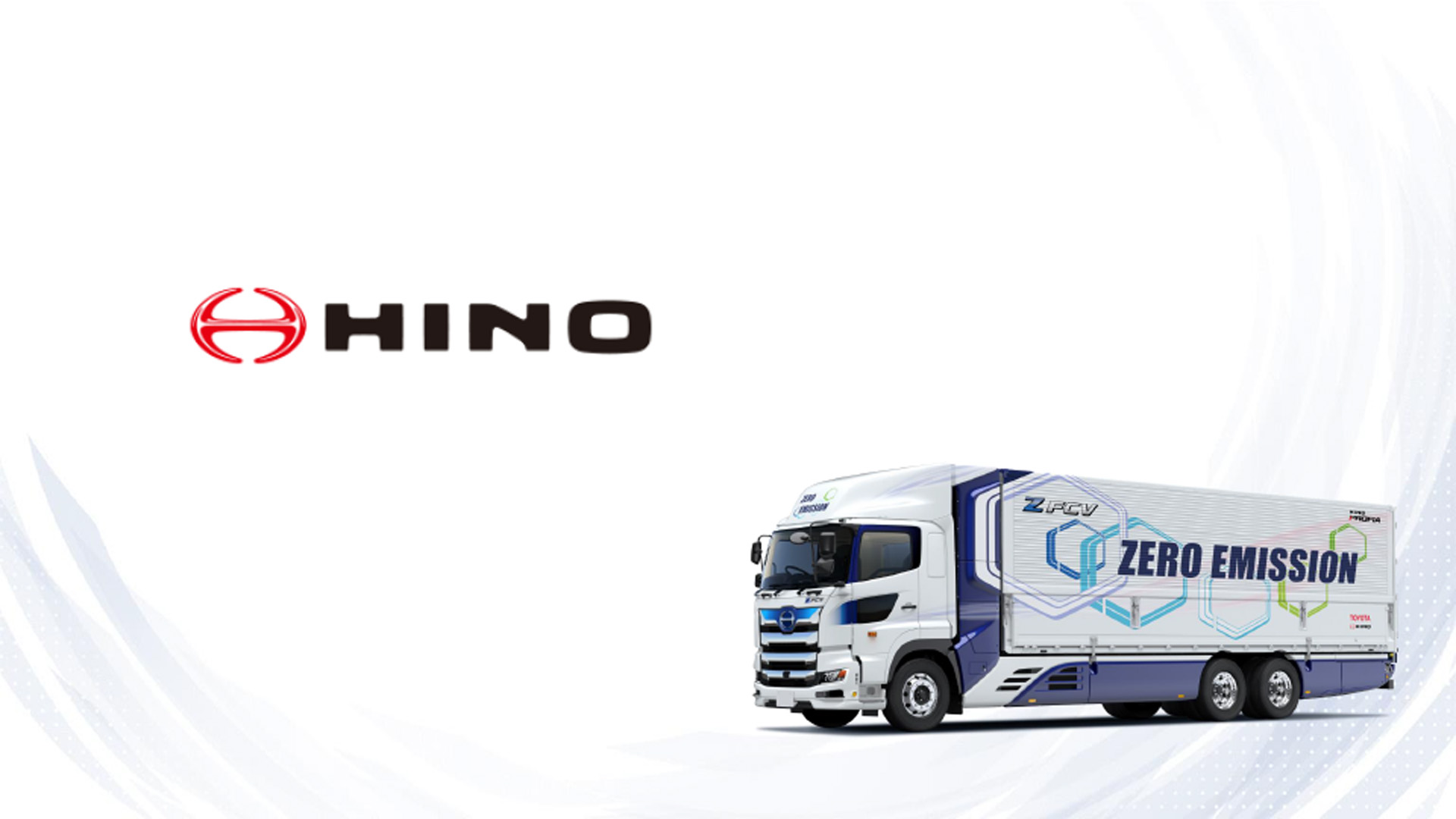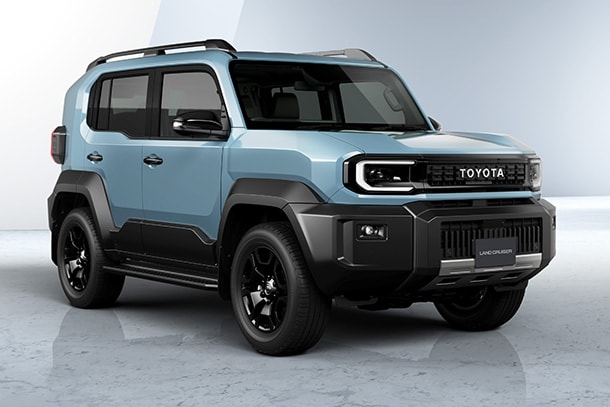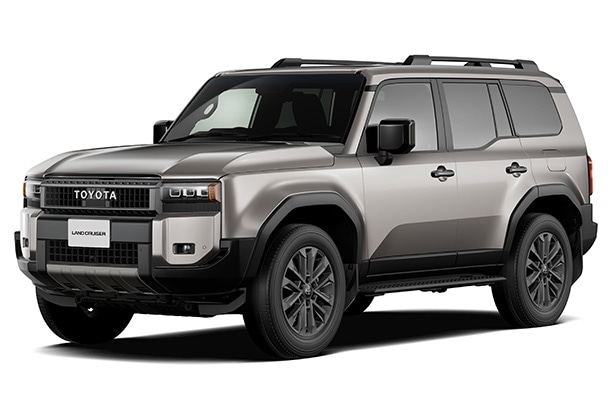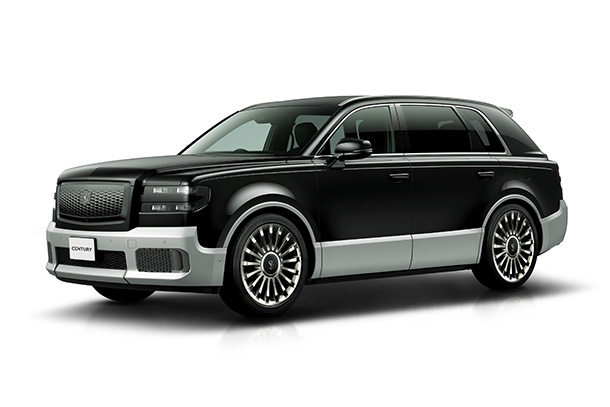May 30, 2023
Joint Press Conference by Daimler Truck, Mitsubishi Fuso, Hino, and Toyota Motor Corporation
The press conference held by Daimler Truck, Mitsubishi Fuso, Hino, and Toyota Motor Corporation can be watched via the following link.
- Koji Sato, President and CEO, Toyota Motor Corporation
- Martin Daum, CEO, Daimler Truck AG
- Karl Deppen, President and CEO, Mitsubishi Fuso Truck and Bus Corporation
- Satoshi Ogiso, President and CEO, Hino Motors, Ltd.
- Koji Sato, President and CEO, Toyota Motor Corporation (Closing)
- Martin Daum, CEO, Daimler Truck AG (Closing)
Presentation
Koji Sato, President and CEO, Toyota Motor Corporation
I am Koji Sato of Toyota. Thank you very much for joining us today despite your busy schedule and the short notice.
Today, Daimler Truck, Mitsubishi Fuso Truck and Bus, Hino, and Toyota agreed to collaborate toward strengthening their commercial vehicle businesses.
Mitsubishi Fuso and Hino will merge on an equal footing to strengthen their global competitiveness. Furthermore, our four companies will pursue new possibilities in the commercial vehicle business by leveraging Daimler Truck and Toyota's CASE technologies.
Today, I would like to talk about the aims of this collaboration and our thoughts behind it.
Behind this collaboration is our four companies' strong desire to create the future of commercial vehicles together.
Commercial vehicles, which support our daily lives through the movement of people and goods, are an important form of mobility that can truly be called part of our social infrastructure. Integrating them into social systems can further enhance the value of mobility.
Toward achieving carbon neutrality, it is essential to evolve commercial vehicles, which account for 40% of the world's automotive CO2 emissions, into environmentally friendly mobility.
In other words, the challenge of creating a new future for commercial vehicles will play an important role in the creation of a prosperous mobility society.
CASE technologies, such as electrification and automated driving, hold the key to this.
CASE technologies are useful to society only when they are widely used, and this requires technological development capabilities.
When it comes to surviving this era of CASE, the Japanese commercial vehicle market is small compared to the rest of the world, and it is difficult for each company to compete alone.
To create a prosperous mobility society, there is a strong need not only for competition but also for all of us to work together to build the future.
With such in mind, we hope to accelerate the spread of CASE technologies through this four-company collaboration.
Through the merger, Mitsubishi Fuso and Hino will enhance synergies between them and improve business efficiencies in development, procurement, and production. By doing so they will strengthen the business foundation and competitiveness of their CASE technology efforts.
Daimler Truck and Toyota will bring together the strengths of both of their companies to support the post-merger company with CASE technologies, while also working to further strengthen the technological capabilities between themselves.
The gathering of our four companies will also open up new possibilities for the future.
Particularly, we believe that initiatives in the hydrogen area are a major theme on which our four companies will focus and cooperate to realize a prosperous mobility society.
From early on, Daimler Truck and Toyota have focused on the potential of hydrogen energy and have actively promoted the development of fuel cell and hydrogen engine technologies.
We have also been working on the commercialization of products and the development of a hydrogen infrastructure to promote the widespread use of such technologies.
Our four companies, including Mitsubishi Fuso and Hino, intend to accelerate the dissemination of hydrogen mobility starting with commercial vehicles.
To work together toward such a future, we will first establish a business foundation that can compete globally through the merging of Mitsubishi Fuso and Hino.
And through healthy competition, we will contribute to a better future for commercial vehicles.
Daimler Truck CEO Daum and I talked about changing the future of commercial vehicles, the necessity of scale for the dissemination of CASE technologies, and the idea that the future is for us to build together.
While sharing these desires and values, we repeatedly discussed the ideal form of our partnership.
We were able to confirm each other's vision in the process, and I believe that we had very meaningful discussions.
I would love for Mr. Daum to share with you his thoughts on this collaboration.
Martin Daum, CEO, Daimler Truck AG
Hello Everyone, I am honored to be here today with all of you and with our partners Sato san and Ogiso san.
I work in this industry for more than three decades and this day definitely is one of the most special days in my entire career.
Because the news we can share with you today is truly great news.
We intend to link the future of two amazing companies―and to shape the future of the commercial vehicle industry in Japan, in Asia, and even beyond.
Let me give you some context.
At Daimler Truck we are very proud of our products.
We are proud of each and every one of the 520,000 trucks and buses we sold in 2022―in North America, for example, with our Freightliner brand, in Europe with our Mercedes-Benz brand, and―of course―in Asia with our FUSO brand.
I am sure our partners here on stage feel exactly the same about their products.
That's because trucks and buses truly fulfill a purpose.
With our vehicles, our customers keep supermarkets, factories and construction sites up and running―and they bring people to work, to school or to their favorite destination.
In short: trucks and buses keep the world moving.
This is true today―and it will also be true tomorrow.
So this will not change.
One thing will change, however: Tomorrow trucks and buses will need to be emission-free.
This means: Our products will become even more amazing.
They will not only keep the world moving―but they will do so in a sustainable way.
So there is an absolutely compelling future ahead of us―and at Daimler Truck we can't wait to make this future a reality.
We are fully committed to lead the technological transformation and to fight climate change.
At the end of 2022 we already hat eight zero-emission trucks and buses in series production.
One prime example is our FUSO eCanter.
We first launched our eCanter back in 2017, as a true pioneer.
Just recently we introduced our Next Generation eCanter which is already available in 70 variants.
So far so good.
But as we are accelerating towards zero emissions there is one big challenge―and this is the required funding.
The transformation of our industry means we have to fund several new drive technologies at the same time: batteries, hydrogen-based fuel cells and potentially also hydrogen internal combustion engines.
This is quite a stretch, even for the leading companies in our industry.
And there is only one way to make this parallel tech development work economically: scale.
Scale is key.
It is absolutely essential to leverage investments and to spread them across a larger base.
And today we are making a bold move in this respect.
We intend to combine the forces of two of the three largest commercial vehicle manufacturers in Japan―and this would increase scale dramatically.
The combined FUSO Hino business would have full access to Daimler Truck technology on the heavy-duty side.
This merger would be a complete game changer.
I am glad that we found the perfect partner who did the very same analysis.
And who has the very same vision.
Everyone, I am convinced that what we are announcing today does not just have the potential to make our companies stronger.
To make our customers stronger by ensuring an even stronger product line-up.
And to boost the transformation to zero-emission transport―and this will benefit all of us.
Thank you very much!
Karl Deppen, President and CEO, Mitsubishi Fuso Truck and Bus Corporation
First of all, hello and thank you to all of you joining us here and around the world.
I'm Karl Deppen, CEO of Mitsubishi Fuso Truck and Bus Corporation.
You've already heard quite a bit about this project from my associates, but let me give you the FUSO point of view.
I'll begin with some background.
The FUSO brand was founded by the Mitsubishi Group over 90 years ago.
Daimler took shares in Mitsubishi Fuso in 2003 and we now hold 89% of the stock.
We sell commercial vehicles in around 170 markets―Mitsubishi Fuso products are well-known for their efficiency, reliability and superior safety.
As leaders for eLDT, we recently started selling the new eCanter.
So, with all that success and history, why are we now tying up with HINO?
Simply put, the world is changing. Our industry needs to change with it.
Japan's economy and society needs state-of-the-art transportation. At the same time, Japan has committed to be carbon neutral by 2050. We take it as our task to be part of the solution to decarbonize road transport.
And today's customer demands more.
Connectivity, automation, electrification; a whole range of advanced services and technology to make logistics as safe, efficient and profitable as possible, all while causing the least possible harm to the environment.
And I'll be frank―developing that takes enormous investment, resources and expertise.
To continue to offer our customers value, while also staying successful ourselves, we need partners, and we need scale.
And who better to tie up with than HINO Motors, a company as dedicated to the CV industry as ourselves?
Together, we will become a force, a strong Japanese truck company with a complementary portfolio of products, a massive network and a workforce of highly experienced employees across the globe.
With this bold move, we will more than double our resources.
That means increased access to knowledge and expertise, a wider network of suppliers and infrastructure, more people working together to develop technology faster.
It means better value for our customers, it provides opportunities for our employees, benefits our suppliers and dealers, and safeguards the return to our shareholders. This merger will position us as the foremost player in the Asian transportation sector, strong enough to compete with all the new brands we see entering the market, especially outside of Japan.
I am really looking forward to all the new possibilities this collaboration will open up.
Another important point for me is the nature of that collaboration.
From the time this discussion first started, I knew we needed a win-win solution for all parties involved.
Merging two companies that have traditionally been competitors is of course a challenge.
This collaboration can only work if we join as equals, respecting each other's strengths and working together to make a future brighter than either of us could find alone.
That is why I am so satisfied with the terms we have set forth here today.
One company, with two strong, distinct brands, supported by the expertise and resources of Toyota and Daimler Truck.
Of course, there's still a lot of work to do. A lot of questions to answer, here in Japan and in all of our markets.
That's why we're going to take our time and do this right.
We're going to check every aspect of this project carefully over the next 18 or so months, with the target of completing the transaction by the end of 2024.
It's a daunting task, but I have full confidence not only in the fantastic team of Daimler Truck and Mitsubishi Fuso, but also in our new friends at Toyota and Hino.
So, let me close by saying thank you and welcome to them.
I'm so excited to see what we will achieve in the coming years. Together, we're going to grow together.
Satoshi Ogiso, President and CEO, Hino Motors, Ltd.
Hino Motors, Ltd. promotes "three reforms" announced in October 2022 as we take the engine certification issues announced last year very seriously to prevent such events from reoccurring.
Hino makes conscientious efforts one by one so that we would be trusted by all the stakeholders including customers.
Our strength is efforts to comprehensively "contribute customers' business" by not only products but also quality, durability, and maintenance in all aspect from sale to after-sales services.
Hino is supported by many people including sales companies in order to protect HINO brand even though inconveniences caused to them during the efforts to ameliorate the certification issues. Through these events, I feel that it is very important to reborn Hino to contribute our customers from now on.
On the other hand, CASE technology development is urgent to solve social issues such as carbon neutrality, driver shortages, and traffic accidents as we face a once-in-a-century revolutionary period.
We continued to discuss about "thorough addressing the certification issues" and "initiatives for the future including carbon neutrality."
I have been worried about and continued to consider how to meet the expectations of the stakeholders, including customers, with colleagues every day.
Although I feel that we are making steady progress in dealing with the certification issues in our daily activities, I do feel that it will be difficult for a single company to respond to future changes, such as carbon neutrality, at the same time.
In these situations, I see the framework of four companies as a once-in-a-lifetime opportunity.
I strongly feel the significance and meaning of walking towards the future with one desire to "contribute to society through supporting mobility" together with
- Daimler Truck and Toyota Motor Corporation, which have excellent CASE technology and are leading companies in commercial and passenger vehicles
- and Mitsubishi Fuso, which has a long history as a Japanese commercial vehicle manufacturer
Hino will rebuild the business foundation by ameliorating misconduct in the engine certification by ourselves and would like to create future visions with this framework of four companies.
Mitsubishi Fuso and Hino have expanded their business into Southeast Asian countries from an early stage, gotten close to local people, and contributed them with transportation and logistics.
I believe this framework of four companies is essential to contribute Southeast Asian countries in the future.
Hino will make company-wide efforts for this project, and I am determined further to create a team that can learn and empathize each other with Mr. Karl Deppen, CEO of Mitsubishi Fuso after the merger scheduled for the end of 2024.
Koji Sato, President and CEO, Toyota Motor Corporation (Closing)
Today, we are taking a giant step in changing the future of commercial vehicles.
We believe that the future will be built by working together. From now on, our four companies will take on the challenge of working together as one. We hope that you will look forward to what we will achieve.
Martin Daum, CEO, Daimler Truck AG (Closing)
For me, Toyota was always a shining beacon on the passenger car side, the leading company of the world.
We are Daimler Truck, the biggest truck company of the world, with a strong commitment to technology as well.
Together with our two companies, Mitsubishi Fuso and Hino, I think this is the perfect combination to lead this industry in the future.
I really like the attitude of Ogiso-san and Deppen-san-how they described the next steps of bringing those two entities together, fully aware that we have two proud, successful Japanese companies to make it a truly Asian leader of trucking.
"Achieving zero, and adding new value beyond it"
As part of efforts to pass our beautiful "Home Planet" to the next generation, Toyota has identified and is helping to solve issues faced by individuals and overall society, which Toyota calls "Achieving Zero," hoping to help reduce the negative impacts caused by these issues to people and the environment to zero. Additionally, Toyota is also looking "Beyond Zero" to create and provide greater value by continuing to diligently seek ways to improve lives and society for the future.
- About Beyond Zero
- https://global.toyota/en/mobility/beyond-zero/
Toyota Motor Corporation works to develop and manufacture innovative, safe and high-quality products and services that create happiness by providing mobility for all. We believe that true achievement comes from supporting our customers, partners, employees, and the communities in which we operate. Since our founding over 80 years ago in 1937, we have applied our Guiding Principles in pursuit of a safer, greener and more inclusive society. Today, as we transform into a mobility company developing connected, automated, shared and electrified technologies, we also remain true to our Guiding Principles and many of the United Nations' Sustainable Development Goals to help realize an ever-better world, where everyone is free to move.
- SDGs Initiatives
- https://global.toyota/en/sustainability/sdgs/
